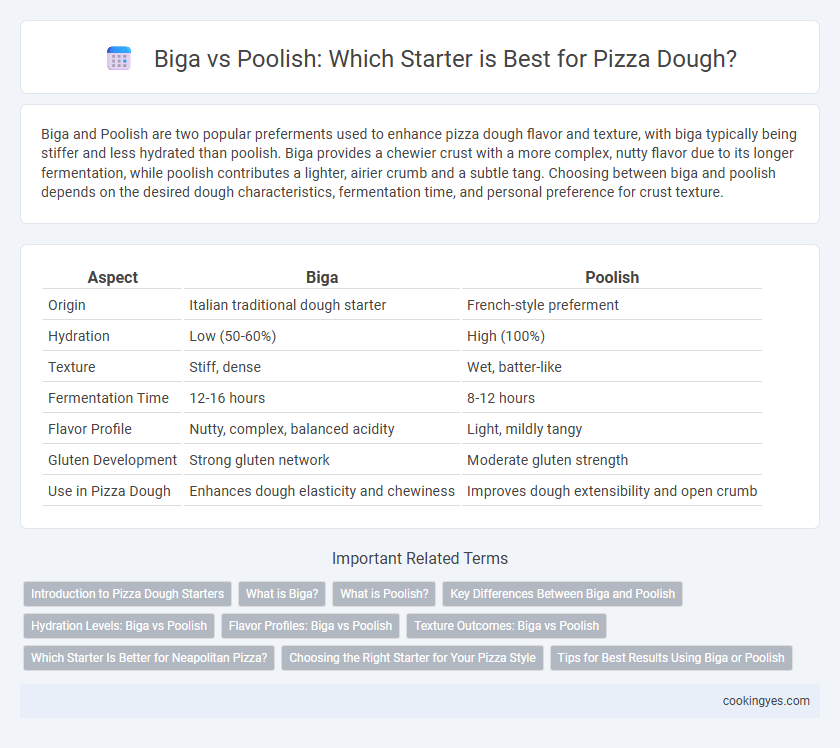Biga and Poolish are two popular preferments used to enhance pizza dough flavor and texture, with biga typically being stiffer and less hydrated than poolish. Biga provides a chewier crust with a more complex, nutty flavor due to its longer fermentation, while poolish contributes a lighter, airier crumb and a subtle tang. Choosing between biga and poolish depends on the desired dough characteristics, fermentation time, and personal preference for crust texture.
Table of Comparison
| Aspect | Biga | Poolish |
|---|---|---|
| Origin | Italian traditional dough starter | French-style preferment |
| Hydration | Low (50-60%) | High (100%) |
| Texture | Stiff, dense | Wet, batter-like |
| Fermentation Time | 12-16 hours | 8-12 hours |
| Flavor Profile | Nutty, complex, balanced acidity | Light, mildly tangy |
| Gluten Development | Strong gluten network | Moderate gluten strength |
| Use in Pizza Dough | Enhances dough elasticity and chewiness | Improves dough extensibility and open crumb |
Introduction to Pizza Dough Starters
Pizza dough starters, such as Biga and Poolish, are essential for developing flavor, texture, and fermentation in traditional Italian pizza. Biga is a stiff, low-hydration starter that offers a more robust structure, enhancing the dough's strength and chewiness, while Poolish is a wetter, liquid starter that promotes a lighter crumb and more open texture. Both starters improve dough extensibility and yeast activity, contributing to a richer, more complex crust profile preferred by artisan pizza makers.
What is Biga?
Biga is an Italian pre-ferment used in pizza dough that enhances flavor and texture by allowing natural yeast fermentation to develop slowly over 12 to 16 hours. It consists of flour, water, and a small amount of yeast, creating a stiff dough starter that improves dough strength and crumb structure. Biga imparts a slightly nutty flavor and increased extensibility, making it ideal for traditional Neapolitan-style pizza crusts.
What is Poolish?
Poolish is a type of pre-ferment used in pizza dough making, consisting of equal parts flour and water with a small amount of yeast, fermented for several hours to develop flavor and improve dough structure. This wet, sponge-like starter enhances the extensibility and fermentation process, resulting in a lighter crust with complex taste profiles. Compared to Biga, Poolish has higher hydration, which promotes gas retention and better oven spring in the final pizza crust.
Key Differences Between Biga and Poolish
Biga is an Italian pre-ferment with a stiff, firm consistency and lower hydration, typically around 50-60%, which produces a chewy texture and complex flavor in pizza dough. Poolish, originating from France, is a thin, batter-like starter with equal parts flour and water (100% hydration), resulting in a lighter, airier crumb and enhanced extensibility. The main differences lie in hydration levels, fermentation times, and textural outcomes that tailor pizza dough for distinct crust characteristics.
Hydration Levels: Biga vs Poolish
Biga typically has a hydration level between 50-60%, resulting in a thicker, firmer dough starter that contributes to a chewier pizza crust with more structure. Poolish features higher hydration, often at 100%, which creates a wetter and more batter-like starter, enhancing extensibility and producing a lighter, airier crumb. Hydration levels in these starters directly impact the dough's fermentation speed, texture, and final crust characteristics in pizza baking.
Flavor Profiles: Biga vs Poolish
Biga imparts a slightly nutty and complex flavor with a denser crumb due to its low hydration, enhancing the dough's aroma and depth. Poolish, with higher hydration, produces a lighter, tangier profile that emphasizes fruity and floral notes from longer fermentation. Both starters enrich pizza flavor, but biga offers a more robust taste while poolish yields a delicate, airy texture with subtle sourdough nuances.
Texture Outcomes: Biga vs Poolish
Biga creates a denser, chewier pizza crust due to its lower hydration and longer fermentation, enhancing gluten development and flavor complexity. Poolish, with higher hydration, yields a lighter, airier texture and a more open crumb structure. Choosing between Biga and Poolish directly impacts the pizza dough's elasticity, crust crispness, and overall mouthfeel.
Which Starter Is Better for Neapolitan Pizza?
Biga and Poolish are both popular pre-ferments used in Neapolitan pizza dough, each impacting texture and flavor differently. Biga, a stiff starter with lower hydration, contributes to a dough with more structure and a chewier crust, ideal for holding robust toppings without collapsing. Poolish, with higher hydration, creates a lighter, airier crumb and enhances the dough's extensibility, resulting in a softer, more delicate Neapolitan pizza crust.
Choosing the Right Starter for Your Pizza Style
Biga and poolish are preferred pizza dough starters that influence texture and flavor; biga, with its stiff consistency and longer fermentation, yields a chewy crust ideal for Neapolitan-style pizzas, whereas poolish, a wetter starter with a higher hydration level, contributes to an open crumb and slight tang perfect for artisan and New York-style pizzas. Selecting the right starter depends on desired crust characteristics: biga enhances structure and subtle complexity, while poolish promotes extensibility and crisp edges. Understanding hydration levels, fermentation time, and dough elasticity helps in tailoring the pizza dough starter to achieve authentic regional flavors and textures.
Tips for Best Results Using Biga or Poolish
For optimal pizza dough using Biga or Poolish starters, maintain a precise hydration level of around 60-70% to balance dough extensibility and strength. Use a cooler fermentation temperature between 18-22degC to slow yeast activity, enhancing flavor development and dough structure. Allow an extended fermentation period of 12-18 hours for maximum enzyme activity and gluten formation, resulting in a tender, flavorful crust.
Biga vs Poolish for pizza dough starter Infographic

 cookingyes.com
cookingyes.com